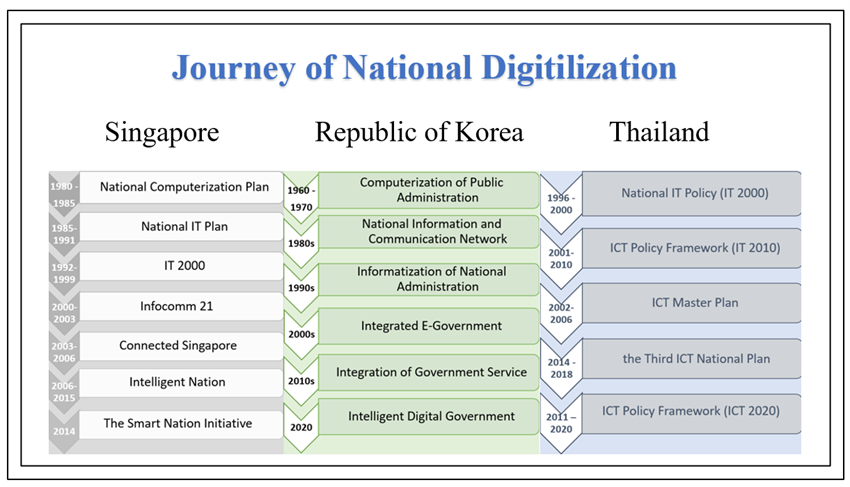2nd DIHAC policy review meeting analysis report
A Brief History of the Republic of Korea, Singapore, and Thailand’s National Digitalization Efforts
2nd DIHAC policy review meeting analysis report
By Nadila Mulati & Myo Nyein Aung
Designing and implementing national information and communication technologies (ICTs) policies is the roadmap to a built digital society. Especially, the COVID-19 pandemic highlighted the pressing need for fostering the ICTs in every aspect of our daily life.
Singapore, the Republic of Korea (ROK), and Thailand were the three countries that are in the top ten ranking in terms of information society within the Asia Pacific Region. A brief look at their ICT policy evolution enables us to have an insight into the reasons behind their success. Therefore, we organized the second DIHAC meeting on May 21, 2021, virtually. Nadila Mulati, a Ph.D. candidate from Juntendo University presented a comparative policy review of three countries in the 2nd DIHAC this meeting that Japan, ROK, and Thai researchers participated in to discuss.

Singapore’s digitalization journey started nearly three decades ago. In early 1980, the government initiated the “National Computerization Plan” which aimed to computerize the government, develop and grow the local IT industry as well as the manpower to meet the need of the industry. This early national computerization effort paved the way for Singapore to become one of the world’s most connected countries today[1]. In addition, a diversity of digital appropriation programs such as digital wallet for the seniors, digital competencies training and Hockers-go-online, etc are found to potentiate digitization in Singapore, yet with a grey digital gap.
The digitalization of the Republic of Korea (ROK) started far earlier in 1960, with the introduction of its first computer IBM 1401 for the census. In 1978, the country established the government’s first five-year master plan to computerize the administration and policies established in subsequent years to develop digital technology. The enaction of the e-Government Act in 2001 as the nationwide scale of e-government project, along with the construction of the government data center in 2005 enabled Korea to integrate e-government. The government introduced the ‘Digital Government Innovation and Development Plan’ for the Post-COVID-19 Era in June 2020, which aims to make the country a global leader through full-scale transformation to digital[2].
As for Thailand, the first national ICT policy was established in 1996, called IT2000 (1996-2000) which aimed to integrate ICT into government administrations, increased ICT capacity, and invested in national information infrastructures. Fast forward to 2017, The Ministry of Information and Communication Technology (MICT) and the Ministry of Science and Technology (MOST) co-developed the Thailand Digital Economy and Society Development Plan (or Digital Thailand Plan for short) as a digital blueprint to revolutionize government operations, business practices, and people’s lifestyle[3].
ROK’s well-established policy, Singapore’s leap, and Thailand’s recent development in digital efforts can be seen as a spectrum of digitization in Asia. It is necessary to find out how those policies brought about the changes and how communities adopted the policy through the digital appropriation programs, especially age-inclusive ones. After the presentation and discussion on the topic of national ICTs policy and the current state of their development, we scheduled the next monthly meeting to start our discussion on the digital indexes.
References:
[1] Smart Nation: The Way Forward Executive Summary. Smart Nation and Digital Government Office Singapore; 2018. Available at: https://www.smartnation.gov.sg/docs/default-source/default-document-library/smart-nation-strategy_nov2018.pdf?sfvrsn=3f5c2af8_2.
[2] Digital Government Policy and Best Practices of Korea: World Bank Group; 2021. Available at: https://olc.worldbank.org/content/digital-government-policy-and-best-practices-korea.
[3] Bukht R, Heeks R. Digital Economy Policy: The Case Example of Thailand. Centre for Development Informatics Global Development Institute, SEED; 2018. Available at: https://diodeweb.files.wordpress.com/2018/05/thai-digital-economy-policy-diode-paper1.pdf
Nadila Mulati is a Ph.D. student at the Department of Global Health Research, Graduate School of Medicine, Juntendo University, Tokyo, Japan.
Myo Nyein Aung is an Associate Professor at the Department of Global Health Research, Graduate School of Medicine, Juntendo University, Tokyo, Japan. He is also affiliated with the Advanced Research Institute for Health Sciences and Faculty of International Liberal Arts, Juntendo University, Tokyo, Japan.
